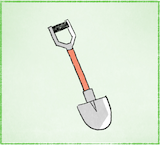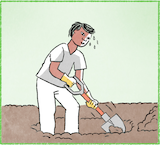

อันนี้คืออี่หยัง อันนี้เป็นพั้ว
พั้วนี้เอาไว้ถ้าเฮ็ดหญัง พั้วนี้กะใซ้ได้หลายอย่าง เอาไว้ไปตักดิน ตักปุย ตักอี่หยังกะได้ที่เฮาสิสามาดเอามันไปตักได้
พั้วเฮ็ดมาจากอี่หยัง กะเฮ็ดมาจากเหล็ก หลือว่าเหล็กเปๆ
พั้วนี้ค้ายๆ กับบักจกคือกัน แต่ว่ามันก่นบ่ได้ แต่ว่าสามาดซ้วนได้หลือว่าตักขึ้นมาได้
มันกะสิต่างจากบักจกหน่อยหนึ่ง ขั้นบักจกกะสามาดขุดได้ ก่นได้ ตักขึ้นมากะได้ แต่อันนี้เอาไว้ถ้าตักขึ้นมา ซ้วนขึ้นมาซื่อๆ ก่นกะก่นได้ ก่นได้หน่อยเดียว บ่สามาดก่นได้ลึก
17
เขากำลังเฮ็ดหญัง กะมีพุซายพุหนึ่ง เขากำลังใซ้พั้วอันหนึ่งนี้หละ กำลังจับพั้ว แล้วกะตักดิน อาดสิซ้วนดินขึ้นมา หลือว่าตักดินขึ้นมาจากในหลุมกะได้
แล้วเขาไปตักดินหลือว่าไปเฮ็ดอี่หยังอยู่หั้น เขากะอาดสิเฮ็ดปูกผัก หลือว่าเฮ็ดสวนนั้นสวนนี้ ปูกอันนั้นปูกอันนี้ เขากะเลยใซ้พั้วอันนี้ไปตักดิน หลือว่าไปพวนดินกะได้
Link to overview page
Link to dictionary
| Isaan | Pronunciation | Tones | Thai | English/Notes |
|---|---|---|---|---|
| อัน | an | M | อัน | 1. thing, object 2. general clf. for objects |
| นี้ | ni: | HF | นี้ | 1. this 2. here |
| คือ | khʉ: | HR | คือ | 1. to be, to resemble, like, as 2. why {บักหล้าคือบ่เก็บโต่ะแน่ = [addressing a young boy] Why haven't you cleared the table?} |
| อี่หยัง | i:-yaŋ | H-M | อะไร | 1. what {นี้คืออี่หยัง = What is this?} {มื้อนี้เจ้าเฮ็ดอี่หยัง = What are you doing today?} {กินเข้างายกับอี่หยัง = What did you have for breakfast?} 2. something, anything, (in negations) nothing {บ่ต้องเฮ็ดอี่หยังอีกเลยนอกจากใส่ปุย = [we] don't need to do anything besides adding fertilizer} |
| เป็น | pen | M | เป็น | 1. to be, to exist 2. to be able to 3. to suffer, sth. happens to 4. เป็นหญัง[...]คือ in initial position: why? {เป็นหญังเขากะคือแปงฟัน = Why is he brushing his teeth?} {เป็นหญังเคี่ยงบินมันคือสิตก = Why is the airplane falling down?} |
| พั้ว | phu:a | HF | พลั่ว | spade |
| เอา | ao | M | เอา | to take, to give {เขากำลังเอาก่องไปซั่ง = he's taking the boxes to weigh them} {หมอกำลังเอายาให้คนป่วยกิน = the doctor is giving medicine to the patient} {เอาไว้ถ้า = is for, is used for, has the purpose of} |
| ไว้ถ้า | wai-tha: | HF-LF | usually in a positive statement or answer: is for, is used for, has the purpose of {กะทะมีไว้ถ้าทอด = a pan is for frying} {น้ำบักนาวมีไว้ถ้าปุงอาหาน = lime juice is used to season food} {ปากกามีไว้ถ้าเขียน = a pen is for writing} {กะเทียมเอาไว้ถ้าเฮ็ดแนวกิน = garlic is used to make food} {ขาเอาไว้ถ้าญ่าง = legs are for walking} {เกิบเอาไว้ถ้าใส่ = shoes are for wearing} Notes: see also ไว้ |
|
| เฮ็ด | het | H | ทำ | to do, to make |
| หญัง | ɲaŋ | M | อะไร, เป็นหญัง = ทำไม | 1. what {เขากำลังเฮ็ดหญัง = What is he doing?} {ธูปเอาไว้เฮ็ดหญัง = What are incense sticks for?} 2. something, anything, (nothing) 3. เป็นหญัง[...]คือ in initial position: why {เป็นหญังเขาคือใส่บักพิกลงไปในกวยเตียว = Why is he putting chili in [his] noodle soup?} {เป็นหญังหน้าต่างมันคือเปิด = Why is the window open?} {เป็นหญังมันคือมีควนไฟ = Why is there smoke?} |
| กะ | ga | M | ก็ | 1. then, consequently 2. also |
| ใซ้ | sai | HF | ใช้ | to use |
| ได้ | dai | HF | ได้ | 1. can 2. to get, to obtain 3. before verb: indicating past tense 4. บ่ได้ + verb: not |
| หลาย | la:i | M | เยอะ, มาก | many, much, very |
| อย่าง | ya:ŋ | H | อย่าง | type, kind, sort, category |
| ไว้ | wai | HF | ไว้ | 1. to keep, to put, to place, to retain, to save, to reserve {เขาเอาหัวของเขาไว้ใส = Where does she put her head?} {หมาสิเลี้ยงไว้บ้าน = dogs are kept/raised in the house} {ไก่เลี้ยงไว้ในคอก = chicken are kept/raised in a coop} {หน้ามันบังไว้ = the face is covered/not visible} {เขาเอาโทละสับวางไว้หู = he holds the phone to his ear} 2. for {นาลิกาปุกมีไว้เฮ็ดหญัง = What is an alarm clock for?} {หม้อเอาไว้เฮ็ดแนวกิน = a pot is used to make food} {ก่องเอาไว้เฮ็ดหญัง ก่องเอาไว้ใส่ของ = What is the box for? It's for putting in stuff.} Notes: see also ไว้ถ้า |
| ไป | pai | M | ไป | 1. to go 2. auxiliary indicating action extending into the future |
| ตัก | tak | M | ตัก | 1. to scoop {ตักน้ำ = to scoop water} 2. to shovel/dig {เอาพั้วตักดิน = to dig with a spade} |
| ดิน | din | M | ดิน | earth, soil |
| ปุย | pui | M | ปุ๋ย | 1. fertilizer 2. manure |
| ที่ | thi: | H | ที่ | 1. that, which {คนที่ยืนอยู่ฝั่งขวา = the person which is standing on the right = the person standing on the right} {เว้าคำที่บ่สุพาบ = to speak words which are impolite = to speak impolitely} 2. for ordinal numbers {ที่สาม = third} |
| เฮา | hao | HR | เรา | 1. personal pronoun: we 2. personal pronoun: I |
| สิ | si | M | จะ | future tense auxiliary {เขากำลังสิตื่น = he's about to wake up} {สิไปตะหลาด = [I'm] going to the market} |
| สามาด | sa:-ma:t | M-HF | สามารถ | can, to be able |
| มัน | man | HR | มัน | it (also used to refer to people) |
| มา | ma: | HR | มา | 1. to come 2. auxiliary expressing action towards the present or focal time {กะคุเฮ็ดมาจากอี่หยัง = What is the bucket made of?} {แล้วเขากะเก็บเงินจากพุนั้นมา = and then she takes the money of that person} |
| จาก | ja:k | LF | จาก | 1. from {... เฮ็ดมาจากอี่หยัง = ... is made from what?} 2. to depart |
| เหล็ก | lek | M | เหล็ก | iron, steel, metal |
| หลือ | lʉ: | M | หรือ | or |
| ว่า | wa: | H | ว่า | 1. that, as {คำว่า X = the word X} 2. to say |
| เป | pe: | M | แบน, เรียบ | flat {ปากเป็ดมันสิเป็นเปๆ = the beak of the duck is flat} |
| ค้าย | kha:i | HF | คล้าย | to resemble, to be similar, to be alike {ทัพพีเป็นค้ายๆ กับซ้อน = a ladle is similar to a spoon} |
| กับ | gap | M | กับ | 1. and {ลุงกับป้า = uncle and aunt} {กวยเตียวหมูกับกวยเตียวไก่ = noodle soup with pork and noodle soup with chicken} 2. with, to {ค้ายๆ กับคำว่า ... = similar to the word ...} 3. prefix in front of foods {กับเข้า = side dishes eaten with rice} {เขากินกับกวยเตียว = he's eating noodle soup} |
| บักจก | bak-jok | M-M | จอบ | hoe, weeding tool |
| คือกัน | khʉ:-gan | HR-M | เหมือนกัน | 1. also, likewise, similarly {ยินดีที่ได้ฮู้จักคือกันคับ = Nice to meet you too!} 2. in negative sentences: either {บ่ลู้คือกัน = I don't know either} {จักคือกัน = I don't know (either)} |
| แต่ว่า | tɛ:-wa: | H-H | แต่ว่า | 1. but 2. only {ฮู้แต่ว่าเขายืนอยู่พุเดียว = I only know that he's standing there by himself} |
| ก่น | gon | H | ขุด | 1. to dig, excavate 2. to dig up a tree by its roots |
| บ่ | bɔ: | H | ไม่ | 1. no, not 2. question particle, transforming a statement into a question Notes: spelling exception in line with common usage on social media |
| ซ้วน | su:an | HF | ตัก, ช้อน | to shovel, to scoop up with a flat tool |
| ขึ้น | khʉn | LF | ขึ้น | 1. to go up, to increase 2. sun: to rise {ตะเว็นกำลังขึ้น = the sun is rising} 3. more 4. bus/train etc.: to get on, to board {พุโดยสานขึ้นลดไฟเบิดแล้ว = all passengers have boarded the train} |
| ต่าง | ta:ŋ | H | ต่าง | 1. to differ 2. foreign |
| หน่อยหนึ่ง | nɔ:i-nʉŋ | H-H | นิดหน่อย | a bit, a little bit, not much Notes: see also หน่อยเดียว |
| ขั้น | khan | LF | เมื่อ | when, if |
| ขุด | khut | M | ขุด | to dig |
| แต่ | tɛ: | H | แต่ | 1. but {แต่บ่ต่างกันหลาย = but not very different} {แต่บ่ลู้ว่าเขาญ่างมาแต่ใส = but [I] don't know where he's coming from, see also: แต่ว่า} 2. only {ตอนนี้มีแต่ขี้ฝ้า = now there are only clouds} |
| ซื่อๆ | sʉ: | H | เฉยๆ | 1. just so 2. so-so |
| หน่อยเดียว | nɔ:i-di:ao | H-M | นิดหน่อย | a bit, a little bit, not much Notes: see also หน่อยหนึ่ง |
| ลึก | lʉk | H | ลึก | deep |
| เขา | khao | M | เขา | personal pronoun: he, she |
| กำลัง | gam-laŋ | M-HR | กำลัง | auxiliary indicating continuous or progressive action |
| มี | mi: | HR | มี | 1. to have 2. there is |
| พุซาย | phu-sa:i | H-HR | ผู้ชาย | man, male |
| พุ | phu | H | ผู้ | 1. person 2. clf. for people {พุหญิงพุหนึ่ง พุซายพุหนึ่ง = a woman, a man} {ซู่พุซู่คน = everybody} {พุหนึ่งโตจ่อยๆ พุหนึ่งโตบักอ้วนหนึ่ง = one person is slim, the other is fat} Notes: pronunciation: also realized as พู่- |
| หนึ่ง | nʉŋ | H | หนึ่ง | 1. one 2. after adjective: intensifier {บักคักหนึ่ง = very much} {อันบักใหญ่หนึ่ง = very large}, or attenuates the meaning {กะดาดมันแผ่นน้อยๆ หนึ่ง = the piece of paper is [relatively] small} |
| นี้หละ | ni:-la | HF-M | นี่แหละ | auxiliary for emphasis at the end of a phrase |
| จับ | jap | M | จับ | 1. to grasp, to hold {เขาจับมือกัน = they're holding hands} {เขายืนจับไอติมอยู่ = she's standing, holding an ice cream} 2. to catch, to arrest {จับพุล้าย = to arrest a criminal} |
| แล้ว | lɛ:o | HF | แล้ว | 1. finished 2. already 3. and then, and next (especially แล้วกะ) 4. auxiliary for past tense |
| อาด | a:t | LF | อาจ | 1. might, may, will 2. likely |
| ใน | nai | HR | ใน | in, within |
| หลุม | lum | M | หลุม | hole, pit |
| อยู่ | yu: | H | อยู่ | 1. to be (located) at 2. yet, still 3. auxiliary indicating continuous or progressive action {ทอดปาอยู่ในกะทะ = (in the process of) frying a fish in the pan} {แม่กำลังเมี้ยนเฮียนอยู่ = mother is cleaning/tidying up the house} |
| หั้น | han | LF | ที่นั่น | there, over there |
| ปูก | pu:k | LF | ปลูก | to grow, to plant {ปูกเข้า = to grow/plant rice} {ปูกผัก = to grow vegetables} |
| ผัก | phak | M | ผัก | vegetable(s) |
| สวน | su:an | M | สวน | garden |
| นั้น | nan | HF | นั้น | that, there |
| เลย | lə:i | HR | เลย | 1. futher on, beyond, past {เข็มน้อยเลยเลขสิบสองไป = the minute hand has passed number twelve} 2. too much 3. at all 4. definitively 5. completely, utterly |
| พวน | phu:an | HR | พรวน | to loosen/break up the soil {พวนดิน = to loosen/break up the soil} |